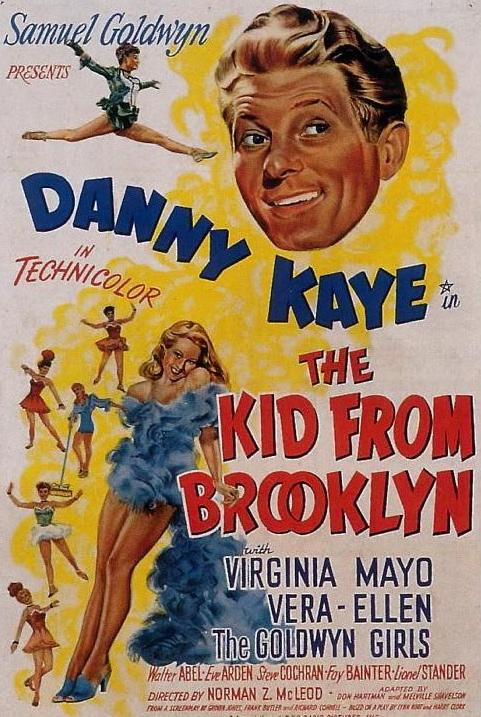Cinema Revisited: The Kid From Brooklyn (1946)
- Aug 16, 2019
- 3 min read
Directed by Norman Z. McLeod. Starring Danny Kaye, Virginia Mayo, Steve Cochran, Lionel Stander, Vera-Ellen, Clarence Kolb, Eve Arden, Walter Abel. Released March 24, 1946. Running time: 113 minutes.

The original play "The Milky Way" was a flop on stage in 1934. It was a modest success when Harold Lloyd made it into a movie in 1936. Then, ten years later, Samuel Goldwyn bought the rights to the play and made "The Kid From Brooklyn," a bright, colorful musical comedy featuring Danny Kaye. While Kaye does not have the personality of Harold Lloyd, "The Kid From Brooklyn" is certainly one of his best films.
Kaye plays a timid milkman who accidentally knocks out the middleweight champ (Steve Cochran) when coming to the rescue of his chorus girl sister (Vera-Ellen). It is explained that the milkman was pushed around as a kid, and learned out to duck and dodge effectively. When he does this during the street fight, the boxer is hit by his burly companion (Lionel Stander). Thus, the milkman gets the credit, including in the newspapers. A fast talking promoter gets him to box in the ring. His girl (Eve Arden) comes up with a scheme to use music to help him win fights.
A consistently funny movie with cheerful musical numbers, the film benefits from its stars and its supporting cast. Diminutive Walter Abel is delightfully blustery as a manager-promoter. Eve Arden is at her dry, wisecracking best as his girl. Virginia Mayo is stunning and appealing as the object of Danny Kaye's affection. And as a punch drunk heavy, Lionel Stander effectively repeats the role he had played in the Harold Lloyd version.
Director Norman McLeod has been an assistant on the Harold Lloyd movie, taking over when director Leo McCarey was out sick. So his helming of this movie stemmed not only from a previous familiarity but from a prowess working with comedians, including a couple of manic Marx Brothers classics: "Monkey Business" (1931) and "Horse Feathers" (1932).
One of the most attractive elements of this production is how handsomely mounted it is as per the usual post-war Samuel Goldwyn movie. Goldwyn opens up this production and really uses the Technicolor process. The outfits, the set design, everything is a pastel of bright colors that blend with perfect cohesion.

Beyond the visuals, the play that flopped on stage continues to work effectively as a film. The comedy maintains nicely because it plays off of the established screen persona of Danny Kaye, whose comic earnestness fits the character perfectly (as had Harold Lloyd). The soundtrack is not particularly remarkable on its own, but the songs were composed by Jule Styne and Sammy Cahn, so they are perfectly serviceable in the context of the movie, maintaining the overall cheerfulness of the production (there is also the song "Pavlova," a Danny Kaye original written with his wife, Sylvia Fine, in 1939). Virginia Mayo's and Vera-Ellen's singing voices are dubbed (Vera, a star of musicals, is primarily a dancer).
Kaye's comedy is not for all tastes (writer James Thurber didn't like Kaye's work and was incensed when Danny was cast in the screen version of Thurber's "The Secret Life of Walter Mitty"). But he is a lot of fun in his best work, including this film, "Wonder Man," "White Christmas" (both also with Vera-Ellen), and "The Court Jester." And he plays well opposite Virginia Mayo who also co-starred with him in "Wonder Man," "Up in Arms" and "A Song is Born."
"The Kid From Brooklyn" is a classic example of immediate post-war Technicolor entertainment. Made for less than $1.5 million, "The Kid From Brooklyn" made nearly $5 million at the box office during a time when admission prices average around 25 cents. Now, in the 21st Century, it holds up as a very enjoyable musical comedy from an era in cinema that has long since passed us by.
Comments